Prime Minister Kyriakos Mitsotakis stressed during a press conference given after the completion of the EU Summit in Brussels, Turkey’s obligations to comply with the 2016 agreement with the EU on refugees, along with the non-instrumentalization of the issue.
The first issue that occupied the work of the Summit was the jump in energy prices and he made extensive reference to the proposals submitted by the Greek side.
At the same time, the Prime Minister pointed out that after his interventions in the text of the conclusions, there is an explicit reference to Turkey fulfilling its commitments arising from the 2016 agreement with the EU and not using refugees and migrants as tools. The text, he said, expresses the EU’s determination to guard its external borders.
“When we faced the crisis in Evros we had the support of the EU. We have to protect our external borders, it would be a European disaster if countries unilaterally suspended their obligations to Schengen because we as EU can not guard our external borders. I see many countries that are not on external borders align with the positions of Greece”.
The third issue that occupied the Summit, as Mr. Mitsotakis said, was that of the pandemic, which is not over yet – “we have a pandemic of the unvaccinated”, he said, while there was a discussion on the issue of Poland.
The EU will not give up its legal tools to address the issues posed by Poland’s stance. Asked later about Greece’s position on this issue, Mr. Mitsotakis said that “there is indeed a menu of options, we start from the soft ones. We have expressed our full confidence in the Commission to handle this matter”.
Answering a question about Turkey’s stance, the Prime Minister noted that now what is happening in our neighborhood is more about the EU, especially now that it is facing the energy crisis. “Turkey has to choose between two paths: sincere cooperation on the basis of international law or provocation. I think it now understands the implications of its choices. Greece is a force for maturity and stability in the Eastern Mediterranean”.
Turkey’s currency reels under economic pressure
Ask me anything
Explore related questions





